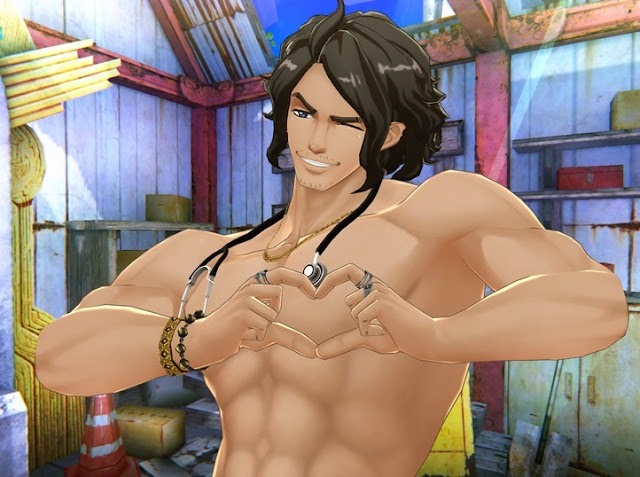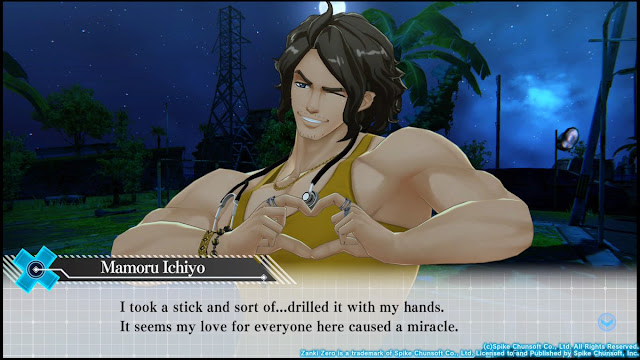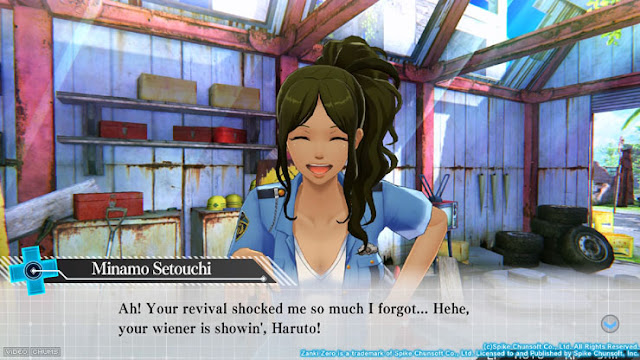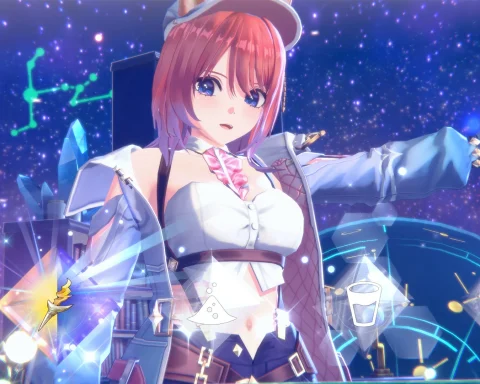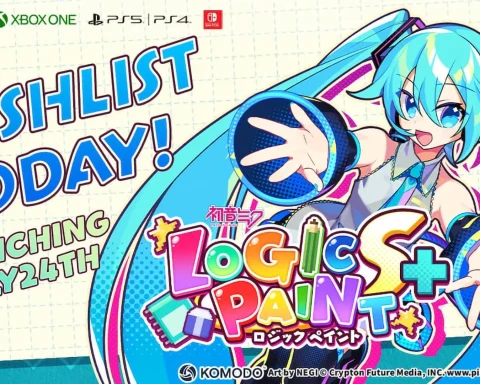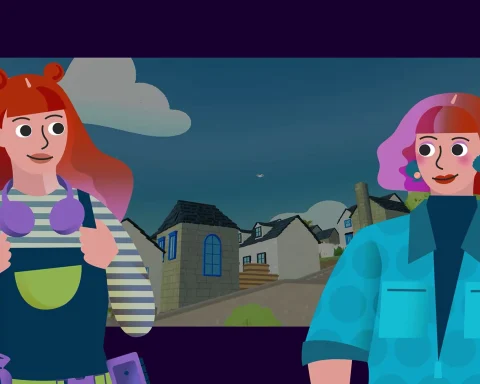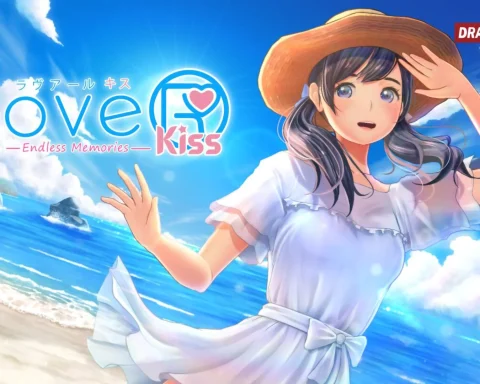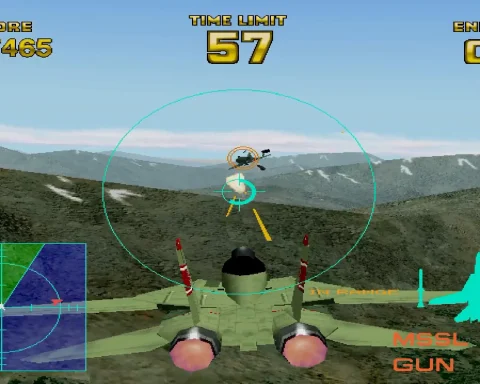Review by Matt S.
Zanki Zero: Last Beginning wants you to believe that it’s different to the Danganronpa series, despite being made by the same narrative and creative team. It positions itself as a dungeon crawler; something a lot more active and game-y than the aforementioned visual novel torture trilogy. But that’s just smoke-and-mirrors stuff, perhaps to try and trick those that would never deign touch a visual novel into giving it a spin. In reality, Zanki Zero is so thematically similar to Danganronpa that it’s closer to a straight out sequel than a spiritual successor, and it won’t take you long to realise that those dungeon crawler elements are the least important part of the game.
Zanki Zero features a cast of eight principle characters, who have all been trapped on an island full of ruins, with no memory of how they ended up there. Quickly they discover an old CRT TV, which mysteriously works despite there being no apparent power source. On pops a cartoon, with two mascot-like characters that are every bit as mysterious as Danganronpa’s Monokuma, only less overtly sinister and antagonistic about it. Don’t worry, though, it won’t take you long to realise their sordid humour and informative helpfulness is a pretense for something every bit as frightening as Monokuma’s own antics. Those two cartoon characters helpfully explain to the team that the world has been destroyed, and they’re the last survivors. Except that they’re also not really survivors, since they’re dead and they are just clones, doomed to short lives of 13 days per cycle.
Thankfully, it’s possible to create new clones, and those retain all the memories of their previous generations. Each character goes through a rapidly accelerated life span – they’ll be “born” as children, spend a brief couple of days as adults, before tipping over the edge and aging quickly thereafter. If they’re killed early by monsters or… goats… then they can be resurrected as a child again early, but there’s not much that can be done to expand their lifespans beyond another day or two.
This is something I immediately found appealing, as I have when other Japanese games have made something of the brevity of life. Zanki Zero isn’t that much different to Oreshika or Stranger of Sword City, where age itself is a resource to be managed, and it’s something that’s actually significant to the Japanese psyche. Through much of its history, the Japanese culture has had a special reverence to the sakura (cherry blossom) tree, which blooms for only a fleeting few days, before filling the air with a shower of petals. It’s blink-and-you’ll-miss-it stuff (much to the chagrin of so many tourists who have hoped to be in Japan for cherry blossom season, only to find that an early bloom meant the season was over before they even got there), and the Japanese see it as analogous to the fleeting experience of life, and the way that people “bloom” rapidly and then fade well before they’re ready for it. Games like Zanki Zero are a manifestation of that philosophy, and even if you were to push aside the anime art and Japanese approach to dungeon crawling action, this game would still be so distinctively Japanese because of the way it handles that theme.
While the team of eight protagonists is still reeling from the shocking revelations that are hitting them thick and fast, the cartoon mascot characters start sending them off on missions to collect machine parts to repair an arcade cabinet, under the auspices of it revitalising the world when complete… the problem is that those machine parts are housed deep within dungeons, and each of those dungeons is a shocking, if not disturbing reflection of the inner being of a protagonist. Each of the eight characters is a fundamentally good person, but each of them is also emblematic of one of the seven deadly sins, and by exploring the dungeons, they’ll come across video tapes, each of which broadcasts how, when they were alive, each character experienced or did something to become guilty of their sin. Much like how Danganronpa labelled each character as an “ultimate” example of a trait, only to use the subsequent death games to twist their “expertise” in some sinister manner, so too are the seven deadly sins core to the character of each of Zanki Zero’s protagonists.
I know right now you’re saying “seven deadly sins, eight protagonists… something’s off there,” and that’s precisely the point. Almost immediately Zanki Zero starts with the very Danganronpa-like mind games, by promising us that one of the team is in some way dishonest, if not the villain, and naturally the paranoia stakes escalate rapidly from there. As a player you won’t want any of the characters to be the villain, since they’re all either lovable, or hilarious, and the interactions between them gives the team a great vibe… when they’re not suspecting one another of destroying the world. This team of writers and developers has always understood how to steadily build characterisation before ultimately subverting expectations better than any. Anyone concerned that the shift from visual novel to dungeon crawler would dilute that talent need not worry; the cast in Zanki Zero have a superb dynamic, ripe for plenty of red herrings and surprises.
One area where Zanki Zero is tonally different to Danganronpa is that the mortal stakes aren’t as high. As players we need to manage the survival side of life on a desolate island, rationing out water and food, while keeping an eye on each character’s stress level and the need to go to the bathroom. But there’s no looming Sword of Damocles – no immediate risk that one of the group is going to try and kill another one, as was the cause of so much tension in Danganronpa. Zanki Zero is more a pure reflection on the weaknesses and failings of humanity than it is a straight death game, and that means that it’s a little more “in the head” and less viscerally impactful. With that being said, the shocks hit hard when they come in, and the allusions to this world being a sort of purgatory to exhibit the worst in human inclinations is certainly an intellectually stimulating one. You’ll be thinking about Zanki Zero for quite some time to come.
I’m reminded of one of my favourite films that uses the seven deadly sins as a core conceit: Se7en. In that film, John Doe (played by Kevin Spacey), went around murdering people in a way that, to his mind, was poetic justice for the sins that they were guilty of. When finally caught by detectives, he says “A woman – so ugly on the inside she couldn’t bear to go on living if she couldn’t be beautiful on the outside. A drug dealer, a drug dealing pederast, actually! And let’s not forget the disease-spreading whore! Only in a world this shitty could you even try to say these were innocent people and keep a straight face. But that’s the point. We see a deadly sin on every street corner, in every home, and we tolerate it. We tolerate it because it’s common, it’s trivial. We tolerate it morning, noon, and night. Well, not anymore. I’m setting the example. What I’ve done is going to be puzzled over and studied and followed…forever.”
In playing Zanki Zero, I get a similar sense that the protagonists, while having affable, likable personalities, and are always themselves a victim in some way, also do genuinely represent their deadly sin, and are being punished for their moral failings. The shocking revelations that come through the game are a way to drive this home and perhaps highlight how comfortable society is in excusing, if not defending, those behaviors. In that context, one of the things I loved most about this game was the way it shifted perspectives. Where with Danganronpa, you would see events throughout through a single set of eyes, with Zanki Zero, each time it comes time to delve into a different character’s “dungeon”, the narrative perspective shifts so that that character whose events are being depicted through these tapes is the one whose eyes we’re seeing it through. That heightens the shocking nature of the revelations by making them seem more personal. As John Doe says elsewhere in Se7en: “Wanting people to listen, you can’t just tap them on the shoulder anymore. You have to hit them with a sledgehammer, and then you’ll notice you’ve got their strict attention.” At its core, Danganronpa was a series that wanted to lift a mirror to the human condition to shock the audience, and Zanki Zero has found an even more personal way to do the exact same thing.
There are certainly more complex dungeon crawlers out there than Zanki Zero. Both in terms of the variety of enemies, and the strategies that you need to overcome them, Zanki Zero comes across as simplistic, and can effectively be played in the same way through the whole game; hit the enemy with everything you’ve got, then strafe around a bit out of enemy range while the attack timer for each of the characters recovers, before closing in again for another hit. Things become challenging when you’re in enclosed spaces, because enemies tend to hit hard, and if you’re cornered you’re in big trouble… but then again, death is a part of the game’s loop, so it’s not necessarily a bad thing if this happens. As long as one of the party of eight survives to get back to home base, all the other characters can be revived, and they’ll have new abilities based on the way they die, making them more powerful and capable in combat.
I still find it hard to move past the sense that if my characters have died then I’ve “failed” on some level. Even despite all the practice that the likes of Dark Souls, Sekiro and Nioh have given me to turn death into a core mechanic for progress in a game, I still have something of a mental block that tells me I’m wasting time when that happens. Zanki Zero’s more immediate returns from a character’s death do make the loop a more rewarding one, and at any rate, this game isn’t meant to be seen as an overtly “difficult” in the first place, so it rarely feels like it’s out there trying to knock off your characters. In fact, the easiest mode removes all the survival elements and reduces combat to a formality, for those who do prefer their Danganronpa-likes to be visual novels.
Characters have in-depth skill trees, and those are as related to combat as they are to survival. For example, one of the most important skills to build up is the one that allows you to construct more complex facilities back at home base, which is invaluable in making sure that your people remain healthy and content. It’ll start out as just a toilet, but soon enough you’ll be playing with kitchens and workshops, and characters will be hanging out with one another in their own rooms. This makes resource management another key feature of the gameplay loop, as there is an incessant demand on resources, but characters have limited inventory space indeed. All of this works, and is generally well implemented, but it’s hard to shake the impression at times that it’s distracting players away from the narrative and real strength of Zanki Zero: the storytelling.
If it takes some JRPG or dungeon crawling mechanics to help broaden the appeal of the kind of storytelling experience that Danganronpa champions, then so be it. Zanki Zero isn’t really “new”; underneath the dungeon crawler window dressing it’s too similar to its predecessors thematically to stand out as a bold new statement. The dungeon crawling elements work well enough, however, and it’s hard to complain that the creators are sticking to their traditions when these games are so intensely intriguing and intelligent. Zanki Zero offers every bit the brilliance that Danganronpa did.
– Matt S.
Editor-in-Chief
Find me on Twitter: @digitallydownld
Please help keep DDNet running: Running an online publication isn’t cheap, and it’s highly time consuming. Please help me keep the site running and providing interviews, reviews, and features like this by supporting me on Patreon. Even $1/ month would be a hugely appreciated vote of confidence in the kind of work we’re doing. Please click here to be taken to my Patreon, and thank you for reading and your support!

